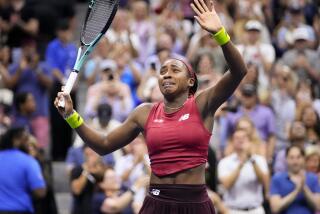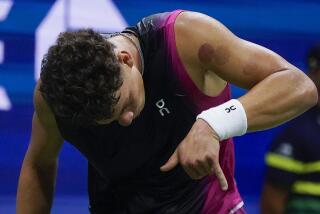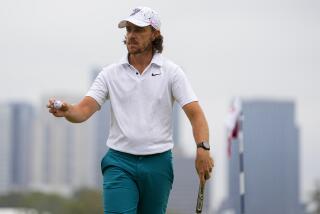Exclamation Point Could Be Coming
- Share via
NEW YORK — Pete Sampras got elevation Monday at the U.S. Open.
Sampras hit a slam-dunk overhead as the finishing shot to his fourth-round victory over Patrick Rafter and that smash made you forget Sampras has some lightly populated spots where hair used to be on the top of his head. It made you forget Sampras is 30 years old, that Sampras is without a tennis title in 15 months, that there has been snickering in the locker room over Sampras’ missing backhand, slower first step, his slumped shoulders and tired eyes.
But that slam-dunk overhead, it was a smash to the mouth of the critics. It was a “take that” answer to those of us who have wondered why Sampras was still hanging around, sluggish and lagging further and further behind the best tennis players.
It sounds funny to say this, but No. 10-seeded Sampras upset No. 6 Rafter, 6-3, 6-2, 6-7 (5), 6-4. Sampras shouldn’t be “upsetting” anybody in the fourth round. But a little more than a year after Sampras won his record 13th major title at Wimbledon in 2000, Sampras came into this Open dragging a 15-month title-less streak and a season of desultory tennis.
There has been something sad about watching the 2001 Sampras. It has been disconcerting to see Sampras missing easy volleys, peppering all corners of a stadium with his backhand, slouching off the court, all courts, even his beloved Wimbledon Centre Court, earlier and earlier.
When Sampras would castigate those who kept asking about when he might retire, you wanted to tell him that it seemed he had already retired, that there was no point for a great champion to hang around and get his brains beat out by Marat Safin at the 2000 U.S. Open or Roger Federer at the 2001 Wimbledon.
The elegant grace of Sampras at his best, the clever way Sampras could move his serve around the box, the swift first step that carried Sampras to the net, the precise power of his volleys, the deadly accuracy of his one-handed backhand, had all been missing for more than a year. Was it age robbing Sampras of his athletic ability? Was it the natural letdown of an athlete who has achieved everything he wanted? Was Sampras playing tennis because he really wanted to or because he had nothing else to do?
Sampras gave us the answer Monday.
He gave us the answer when he pumped a fist after hitting a crackling backhand past Rafter, a fierce volleyer who couldn’t even put his racket out before the backhand had whizzed past. The answer came with the way Sampras shouted “Ah,” after breaking Rafter’s serve in the first set. It came in the easy way Sampras held serve to win that first set after missing on six set-point chances in the previous game. Sampras could have been discouraged, but instead hit a 123-mph ace in that clinching game.
Sampras brought to life the Stadium court crowd with his exquisite volleys and his leaps of joy, with his bright smile after a winning, running forehand and with the primal, growling “Yes!” he shouted after hitting his final winner. “I wanted to show some emotion,” Sampras said.
Sampras is a ravenous consumer of the media. He knew that for the first time in his career, his ability and desire were being questioned. John McEnroe said on TV that the news of Sampras’ vulnerability had spread through tennis locker rooms this season faster than any e-mail. This is not something Sampras will admit.
But, when he won the final point, ran straight at the CBS camera, pointed into it and shouted, Sampras was telling all the doubters, all the critics, all the locker-room reputation-busters to spread this faster than e-mail: “I’m still here.”
Rafter, a two-time U.S. Open champion, is planning, at the end of this year, to take a break from tennis.
The 28-year-old Aussie has a sore shoulder and a yen to see what “real life” is like. Yet, until Monday, it seemed Rafter’s skills were still sharp and his will still strong.
And then Rafter met this fiery, focused, furious Sampras.
“No doubt about it,” Rafter said. “Pete came out on fire. He seemed pretty pumped up to me. I think Pete is still playing well. I think he’s a contender.”
If Sampras wins this Open, his 14th Grand Slam title, his fifth Open, it will be his greatest accomplishment.
Having knocked out Rafter, Sampras must next play Andre Agassi on Wednesday, probably a night match in front of a hyped-up crowd. This is much too soon. Agassi destroyed Federer before Sampras took out Rafter. Agassi and Sampras shouldn’t be playing in the quarterfinals of a U.S. Open. This match should be Sunday, all alone, another epic battle.
Should Sampras beat Agassi, he may have to face Safin in the semifinals. Safin was the first player to make Sampras look old in last year’s final. In straight sets, the rookie Open finalist left Sampras flat-footed and discouraged. If Sampras gets past that rematch, it’s hard to imagine how he might do in a final against, say, the world’s No. 1 player, Gustavo Kuerten, or maybe the young American hope, Andy Roddick.
“Pete’s going to have a very, very tough match against Andre though,” Rafter said. “As you know and I know, though, you never write off Pete.”
Well, we don’t all know this. Maybe Pete didn’t even know.
A month ago Sampras seemed lost and dispirited. He was made to look less than average by Agassi in the finals of the Mercedes-Benz Cup at UCLA. Sampras was gone. His gorgeous game had disappeared.
On this sunny, Labor Day Monday in New York, that game was back. For only an afternoon?
“I feel like I’m up to the challenge,” Sampras said. “I’ve got a good shot at possibly moving on.”
Sampras had played as if he meant what he said for the first time in a long time.
*
Diane Pucin can be reached at diane.pucin@latimes.com.
(BEGIN TEXT OF INFOBOX / INFOGRAPHIC)
At a Glance
* Today’s featured matches: Martina Hingis (1) vs. Daja Bedanova; Lleyton Hewitt (4) vs. Tommy Haas (16); Gustavo Kuerten (1) vs. Albert Costa.
* Stat of the day: Agassi and Sampras will meet for the 32nd time on Wednesday. Sampras has won 17 times, including U.S. Open finals in 1990 and 1995.
More to Read
Go beyond the scoreboard
Get the latest on L.A.'s teams in the daily Sports Report newsletter.
You may occasionally receive promotional content from the Los Angeles Times.










